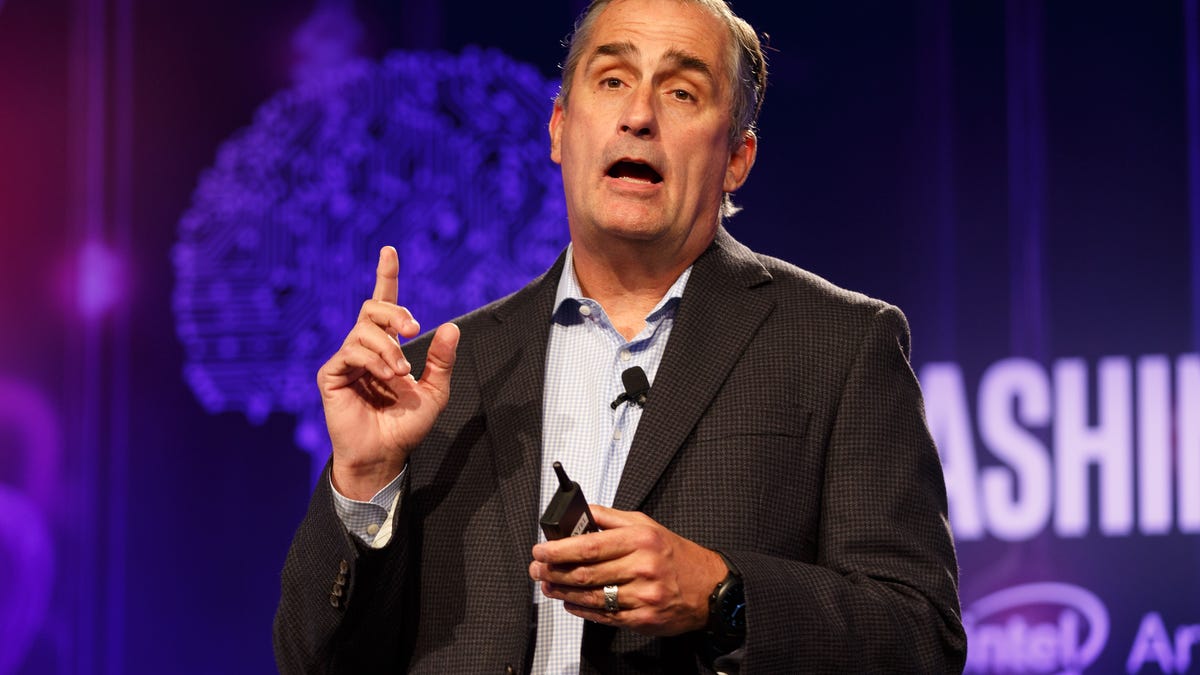Intel determined to power AI revolution, not be left behind
Artificial intelligence technology promises to revolutionize our lives. The world's largest chipmaker is working feverishly to make sure it can profit from the change.
We all know processors are the brains of a computer. But the booming field of artificial intelligence takes the metaphor to a whole new level -- and Intel wants to make sure it's propelling the change, not being left behind.
Despite Intel's financial might and technological prowess, the company stumbled with the last big overhaul of the computing industry, the arrival of smartphones, tablets and mobile devices. The company's high-profile "Intel Inside" publicity campaign failed to extend beyond its PC stronghold.
With AI, though, the company is determined to be a key player to profit from the technology that could transform just about everything you do.
"Intel is committed to deliver the next generation of AI," said Chief Executive Brian Krzanich, speaking Thursday at a company event in San Francisco to show off a smorgasbord of Intel AI products and plans.
Diane Bryant, general manager of Intel's data center group, speaks of the company's AI efforts.
Artificial intelligence research has lurked in academic circles for decades, but new work from companies like Facebook, Microsoft, Apple and Google have made AI into one of the hottest areas in computing. AI systems recognize your friends in photos, screen out spam emails, read photo captions to blind people, and figure out what word you're likely to type next on your keyboard.
And that's just today. The same way appliances replaced domestic servants and robots replaced assembly-line workers, AI could replace humans in white-collar jobs in medicine, law, accounting, and more.
Closer to home
Intel struggled for years to build its mobile processor business, but AI technology is closer to core businesses, like powering most of the machines in Google and Facebook data centers.
Nervana Systems GM Naveen Rao speaks at an Intel AI event.
But there are still plenty of challengers. Nvidia, for example, has repurposed its graphics chips popular for video games into data center processors good for AI work. And Google is designing its own custom AI processors, too. BMO Capital Markets said in a Thursday report it expects Nvidia data center revenue for 2016 to more than double to about $800 million. Intel should clear $17 billion, but its growth is much slower right now.
But AI could change Intel's growth rate.
"Artificial intelligence is the next big computing opportunity," said Doug Davis, an Intel senior vice president.
Intel's work ranges from processors to high-level work making AI software easier to use. A key priority is democratization, so you don't need a Ph.D. to benefit from AI.
What's cooking?
- In the second half of 2017, Intel will release its Nervana Engine chip, code-named Lake Crest, that stems from its acquisition of startup Nervana this year. The processor is designed for deep learning -- a core AI technology inspired by human brains through an approach called neural networks. It's geared in particular for the computationally intense and time-consuming initial AI "training" period. "We expect that to be the highest performing solution in the marketplace," said Barry Davis, general manager of Intel's accelerator products group.
- Nervana technology initially will slip into computers as an add-on card, but Intel plans to integrate it tightly with its Xeon processors in a project called Knights Crest. And by 2020, the Nervana technology will increase performance by a factor of 100, said Diane Bryant, general manager of Intel's data center group.
- In 2017, Intel will release a faster version of its Xeon Phi processor code-named Knights Mill that quadruples performance compared to today's model. The Phi products are designed for running lots of computational tasks in parallel and also can handle some neural network chores.
- Through partnerships, Intel is tuning a slew of outside AI software projects to run better on its processors, including Google's TensorFlow, the Apache Foundation's Spark and Facebook's Torch. That's sped up projects like Pikazo, which extracts the style of one photo and applies it to another. Before, the company could generate a 1-megapixel image in 1 hour. Now it can generate 12-megapixel images in 5 minutes.
- Intel is working to help online learning site Coursera add a series of AI courses. For one, from Intel itself, the company will look at student resumes from the top 10 percent for internship positions at the company.
- Intel's Saffron group, acquired in 2015, uses a different approach to AI than neural networks, but it's working for some customers like USAA, an insurance company with 12 million members. Within 10 hours of using Saffron, "we found a fraud ring bilking members of $2 million a year," said Robert Welborn, the company's data science leader.
Expect more changes from Intel, its competitors and partners. "The AI market is still in its infancy," Krzanich said.


